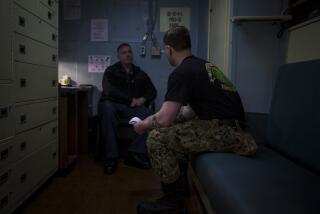Military Padres : Chaplains Offer Trust, Peace in Warlike Setting
- Share via
The military chaplain walks a fine line, upholding religious principles of trust, peace and kindness in organizations geared to the rigors of war.
But leaders of these ministers in uniform say their work is neither inconsistent nor compromised, and religious ideals are all the more important on a front of danger to them.
“Cooperation without compromise,” reads the Army chaplains’ motto.
“We do ministry without compromise and without apology,” said Gen. Stuart A. Barstad, retiring this month after three years as Air Force chief of chaplains.
“Peace movements should not think they have a corner on the market,” he said. “They are not the only ones interested in peace.”
Magazine Interview
Barstad and three other top U.S. military chaplains commented on their roles in recent interviews with The Lutheran, the monthly magazine of the Evangelical Lutheran Church in America.
Remarkably, all of them are clergyman of that denomination, as is the nation’s fifth top military chaplain, Army Col. Herbert B. Cleveland, director of chaplain services for the Veterans Administration.
Together they oversee work of about 13,000 military chaplains and assistants of various faiths serving families of nearly 3 million members of the Army, Navy, Marine Corps, Air Force and National Guard, as well as veterans.
The chaplaincy chiefs say they are carrying out full, undiluted ministry in an environment that keenly needs it.
“The military has never asked me to hold back on my ministry or my preaching,” said Barstad, originally from Colfax, Wis.
‘Ministry of Presence’
Maj. Gen. Norris Einertson, Army chief of chaplains, called it a “ministry of presence.”
“My parishioners (Army personnel) are contributing to peace in a troubled world,” he said. “The military’s first function is to keep the peace, not make war.”
Einertson, originally of Westbrook, Minn., added, “We are always faced with alternatives. We are not being Christian if we allow the rights of any to be trampled on by oppressors of the left or right.”
He said that American churches are not teaching Christians to think critically about war and peace, resulting in their either approving armed conflict indiscriminately or rejecting it as always wrong.
Rear Adm. Alvin B. Koeneman, Navy chief of chaplains, conceded that the work involves some tensions, but said these must be seen in the light of what Christianity says about the sinful nature of societies, as well as about peace.
Living the Contradiction
“It’s tough to talk about the peace of Jesus while working on an ammunition ship,” he said. “But sailors live in that situation. Someone needs to be there to live the contradiction with them and wrestle with it.”
Koeneman, originally from Omro, Wis., pointed out that, unlike hospital or prison chaplains who go home at night, in the military, “you eat the same food” as the personnel and live with them.
“If they’re stuck in the mud, you’re in the mud,” he said. “If they’re getting shot at, you’re getting shot at. It’s one thing to talk with a sailor about being lonely, but another when you’re both a long way from home.”
Col. Walter Hiskett, Marine chief of chaplains, was a wounded combat veteran of the Korean war before entering the ministry and then volunteering for his first tour of duty as a chaplain in Vietnam.
For that, he called himself “dumb-dumb,” but added, “These people deserve ministry. The thought of no chaplaincy, no ministry to these people was unconscionable.”
Advise Command Staffs
The chaplain chiefs point out that they advise command staffs on matters of morale as well as religion and morals, thus exerting an influence on military policy.
They “make an impact on the institution,” Barstad said. “The military is part of our national structure. We must ask, ‘Do we want to be represented there, and how best can we minister--as insiders or outsiders?’ ”
Said Koeneman: “You can make a far more profound witness for peace working within the system than you can carrying a placard or throwing goat’s blood on some naval installation.”
The chaplaincy chiefs said they often have presented church social statements on peace and war to military leaders in the Pentagon.
“They want to know what the churches are saying,” Einertson said.
“The military is a very religious community,” Barstad said. “The institution recognizes that the faith dimension is a crucial part of life. There are many people here who are concerned about their faith.”
Einertson, referring to the chaplaincy’s ecumenical setting among those of various faiths or none, said the “military stretched a pastor more than any other environment.”
“It’s not all brass bands and flags,” Koeneman said. “There have been times when I was depressed and wondered, ‘What’s a nice guy like me doing here?’ But I knew. It was there to bring them a word from the Lord.”
More to Read
Sign up for Essential California
The most important California stories and recommendations in your inbox every morning.
You may occasionally receive promotional content from the Los Angeles Times.













